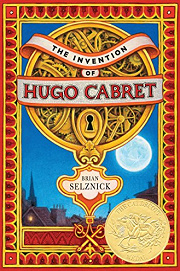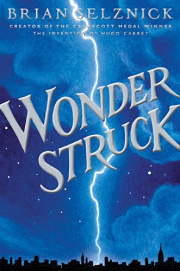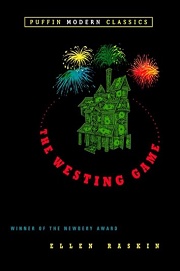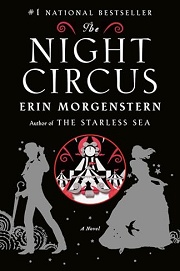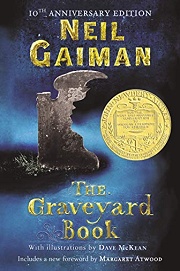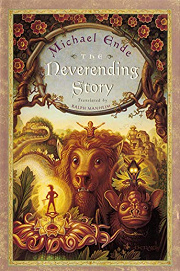Share your thoughts in a quick Shelf Talk!
The Invention of Hugo Cabret by Brian Selznick
"Inside a bustling Paris train station, a secretive orphan keeps the clocks running—until a mysterious automaton and a pioneering filmmaker unlock a hidden legacy. Lushly visual and full of wonder, The Invention of Hugo Cabret celebrates curiosity, cinema, and the magic of machines and dreams."
Have you read this book? Share what you liked (or didn’t), and we’ll use your answers to recommend your next favorite read!
Love The Invention of Hugo Cabret but not sure what to read next?
These picks are popular with readers who enjoyed this book. Complete a quick Shelf Talk to get recommendations made just for you! Warning: possible spoilers for The Invention of Hugo Cabret below.
In The Invention of Hugo Cabret, did you enjoy ...
... the cinematic, image-driven storytelling that interlaces silent-picture sequences with prose to unveil a hidden family history?
Wonderstruck by Brian Selznick
If the silent, wordless spreads in The Invention of Hugo Cabret felt like a movie unspooling in your hands—leading you from Hugo’s automaton sketches to the revelation of Georges Méliès—then you’ll love how Wonderstruck pairs a drawn, silent tale (about Rose in 1927) with a written one (about Ben in 1977). As Hugo followed a key-shaped pendant and a notebook to the secret past of a legendary filmmaker, Ben and Rose follow clues through museums, dioramas, and the echoes of silent cinema to uncover how their stories fit together. It captures that same hush of discovery you felt during the film screening that changes Hugo’s life.
... the intricate, clue-by-clue sleuthing that turns small details into a grand reveal?
The Westing Game by Ellen Raskin
If you delighted in piecing together Hugo’s clues—from the automaton’s cryptic drawings to Isabelle’s heart-shaped key—Ellen Raskin’s puzzle-box mystery will scratch the same itch. As Hugo used gears, notebooks, and a hidden past to decode Méliès’s secret, Turtle Wexler and the other heirs chase wordplay clues, false leads, and explosive surprises to solve Sam Westing’s will. The pleasure is in the deduction: every scrap of information counts, and the final reveal lands with the same satisfying click as a clock that’s been set just right.
... that feeling of clockwork marvels and stagecraft revealing secret worlds just out of sight?
The Night Circus by Erin Morgenstern
If Méliès’s moon-bound rockets and Hugo’s meticulously tended clocks filled you with awe, the black-and-white tents of The Night Circus will do the same. Celia and Marco’s midnight creations feel like living illusions—much like the automaton’s sketch coming to life—with the clockmaker Herr Thiessen crafting a marvel that echoes Hugo’s devotion to gears and timing. Where Hugo discovers magic in reels of film and hidden mechanisms beneath the station, you’ll find it here in tents that defy physics and a secret contest that turns craft and spectacle into something transcendent.
... a resilient orphan’s resourcefulness and tender coming-of-age amid found guardians?
The Graveyard Book by Neil Gaiman
If you were moved by Hugo fixing clocks in the station’s walls, dodging the Station Inspector, and slowly finding a family with Isabelle and Méliès, then Bod’s journey will resonate. Raised by ghosts and guided by the enigmatic Silas, Bod learns strange skills (fading, slipping through shadows) much as Hugo masters escapements and secrets—each boy confronting dangers from a past that won’t let go. Like Hugo’s final reconciliation with Méliès’s legacy, Bod’s choices lead to a bittersweet, hopeful step into the wider world.
... a story-within-a-story that pulls a young reader into the tale to change it from the inside?
The Neverending Story by Michael Ende
If you loved how Hugo’s present-day mystery opened into the hidden narrative of Georges Méliès—where the story of early cinema becomes the key to Hugo’s life—this book takes that nesting to a wondrous extreme. Bastian reads about Atreyu’s quest to save Fantastica and then discovers the tale needs him, just as Hugo realizes his automaton’s drawing points straight into Méliès’s forgotten past. The thrill is in crossing the threshold from observer to participant, and watching how a boy’s belief can restore a world’s lost magic.
Unlock your personalized book recommendations! Just take a quick Shelf Talk for The Invention of Hugo Cabret by Brian Selznick. It’s only a few questions and takes less than a minute.
